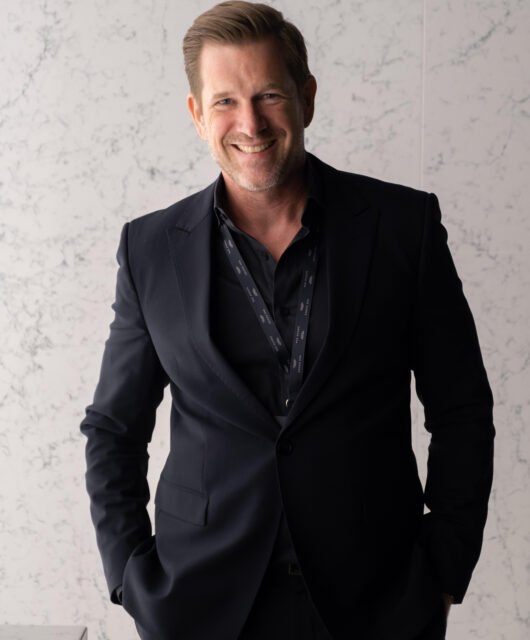Week: June 8th -12th
by Interbrand
Several weeks ago, when the gravity of the situation became clear, Interbrand started regular reporting on how brands were dealing with the COVID-19 crisis. What’s now becoming clear is that the current climate is one of near perpetual disruption. So the brand consulting firm made the decision to keep on telling the stories of inspiring brand leadership and strategy amid the latest crises in an anxious world. Interbrand’s goal remains the same: to provide an up-to-the-minute source of information, inspiration and insight on brand moves as they happen.

Fashion & Retail
Days after reports that Amazon plans to delay the summertime deal extravaganza known as Prime Day, the ecommerce platform confirmed it is hosting a Big Style Sale later this month. An Amazon spokesperson said the June 2020 event will “include seasonally relevant deals from both established and smaller fashion brands.” The event is intended to boost sellers hurt by the coronavirus pandemic and the delay of Prime Day.
However, sellers will participate on an invitation-only basis, and Amazon has asked these sellers to submit items with discounts “of at least 30%” by Wednesday. “We are delighted to help brands connect with our vast global customer base for this event,” Amazon said. The Big Style Sale could be an attempt by Amazon to sustain interest even if Prime Day is moved closer to back-to-school and holiday shopping this year.
It’s also not surprising to see Amazon focus on clothes; the ecommerce platform has long sought to become a destination for fashion. In 2018, for example, it launched the Prime Wardrobe service, allowing all U.S. Prime members to order clothing, shoes, and accessories to try on at home. In 2019, it added a styling service.
Amazon shares have climbed more than 30% this year, but some online retailers are faring even better. Shares of Wayfair, the online furniture and home goods seller, have doubled in price in 2020. Etsy, a platform that specializes in handmade products, said its marketplace grew 100% in April, and its stock has gained more than 90%. “One big driver of the strong growth in April was fabric face masks,” Etsy CEO Joshua Silverman said. Chewy, an online company for pet products, has jumped about 75% this year, while US shares for Chinese e-commerce giant JD.com have rallied about 60%.
Foot Locker has long been a staple of the mall, with an estimated 80% of its stores being located in malls as of 2018. But with fewer people turning to malls do to their shopping, Foot Locker has been looking to move more of its stores out of enclosed shopping centers. Now, the coronavirus is accelerating those plans, CEO Dick Johnson said. Foot Locker’s strategy for the past two years has been to open more Power Stores, its name for its off-mall stores.
These stores are four times the size of a typical Foot Locker store in the mall and are meant to serve as community events centers in addition to stores. But right now, in-store events are out of the picture, and larger store formats could risk losing the company more money if customers aren’t showing up. So Johnson said that the company would also be looking into more “nomadic retail, or pop-up retail.”
Department store Galeries Lafayette opened the doors of its historic flagship in Paris on Saturday for the first time in almost three months, as French business gradually resumes amid continued restrictions aimed at controlling the coronavirus pandemic. “It’s an emotional moment,” said Philippe Houzé, chairman of the board at Galeries Lafayette Group. “I’ve been coming here regularly but seeing the store empty is fun for about five minutes.
It’s quite something seeing this whole place shut. It’s as if there had been a nuclear war.” His son Nicolas Houzé, chief executive officer, has said he expected revenues this year to drop by 50 percent to around 1 billion euros. “In terms of profits, it will be even more,” said Philippe Houzé.
Clothing sales in France fell 85.5 percent in April, as all ready-to-wear stores remained shut nationwide, according to the latest data from the Institut Français de la Mode. Retailers’ revenues were down 30.9 percent in value terms in the first four months of the year, compared with the same period a year ago, it said. Alexandre Liot, director of the Boulevard Haussmann store, which is famed for its Art Nouveau glass cupola, compared the atmosphere to the start of a new school year. “Our staff are eager to be reunited and to get back to work,” he said. “We all have a huge smile behind our masks, as you can imagine. We’ve been waiting for this for three months.”
Chinese ecommerce platform Alibaba has announced new products and services it hopes will help U.S. small businesses attempting to go digital and reach new audiences abroad. They include a freight service to book and track bulk shipments by air and sea; a financing option for cross-border trade, which allows qualified buyers to order goods and pay for them up to 60 days after they are shipped instead of upfront; and, in the absence of live trade shows this year, a series of livestreamed events to connect U.S. manufacturers and wholesalers with buyers.
“Doing business online is the bridge for American small businesses through this crisis and into the next decade,” said John Caplan, president of North America and Europe at Alibaba.com. “We are accelerating our transformation to get both sellers and buyers quickly set up for success and provide the critical tools and services that are required for growth—access to supply and demand, shipping and logistics, and working capital.”
The move seems aimed at least partly at Amazon sellers looking to diversify. Zach Weinberg, director at research firm Gartner, agreed that it makes sense for Amazon sellers to explore other options now. “In our very recent digital commerce consumer survey, we found that 85% of consumers have changed at least one shopping behavior in at least one category since the outbreak,” he said, including 36% of consumers who shopped via a website or app they’d never used before.
“82% of these consumers are satisfied with their new shopping experience, and 85% of these consumers expect to use the websites or apps about the same or more in the next 12 months.” Adjusting fulfillment strategies can help brands and sellers future-proof themselves, Bowman said. “Brands need to build a relationship with a non-Amazon fulfillment company to either replace Amazon outright or operate as a backup in case we ever have another shutdown that causes Amazon to deprioritize products and extend their ship times.”
Media & Entertainment
British Vogue’s July issue cover features key workers instead of professional models. A community midwife, a train driver and a supermarket worker are the stars of the latest edition. In a statement posted to Instagram, British Vogue editor-in-chief Edward Enninful explained that the magazine decided to profile the women to pay homage to their bravery and dedication to helping others. “This chapter in history has seen a society shift its attention onto some of the people in this country who are not usually afforded the spotlight,” Enninful wrote. He said the frontline workers’ commitment during the pandemic “has stunned all of us.”
Both the Wall Street Journal and financial news publication Barron’s have seen record traffic and engagement figures in recent months. The 2020 Edelman Trust Barometer Spring Update showed that trust in traditional news media is at an all-time high, up seven per cent on the previous year, and additional research from the Kantar Covid-19 Barometer 2020 shows that just eight per cent of consumers think that brands should stop advertising during the pandemic.
Sports
NBA owners will vote on resuming the 2019-2020 season at Walt Disney World late next month. The teams that would participate – 16 teams in playoff positions in the rankings and six that were close to making them – would send essential personnel to live at the Disney resort, and play games in empty arenas. The players’ union still has to approve the plan, though the league’s commissioner, Adam Silver, has been negotiating with the head of the union, Chris Paul. Bob Iger of Disney, which owns ESPN and the resort, is also involved.
Hospitality
One of the major winners from lockdown has been food delivery, and Grubhub is now fielding interest from at least two European food delivery companies, as antitrust concerns have affected the chances of an Uber acquisition. Netherlands-based Just Eat Takeaway.com and German company Delivery Hero have apparently expressed interest in merging with Grubhub. The company generates most of its revenue from the U.S., serving more than 1,600 cities, but is also operational in London. A deal with a European-based company would likely carry far lower regulatory risk than merging with Uber, which would combine two of the four largest U.S. food delivery services. DoorDash and Postmates round out the top four.
Travel
While the aviation industry estimates that air travel will take no less than three years to recover to preoutbreak levels, 24 European countries have agreed to work together on international rail transport and make it “an attractive alternative” over distances where it is currently not competitive. According to the joint letter sent to EU transport boss Adina Valean, “international passenger rail transport is presently not performing to its potential within the EU.”
Issues such as complex ticket buying systems for multi-leg journeys with different companies should be addressed by digital solutions, it adds. Frequent rail travelers have long called for an online platform similar to Skyscanner to be set up, perhaps by the EU. The ministers also insist that international services can increase their share of passenger numbers in the 300-800km category, suggesting that rail will be taking the fight to short-haul flights, which generally fall under the 1,000km mark.
Research by UBS recently showed that business travelers would put up with a trip time of four hours, while leisure travelers would tolerate six on average. It is in that window where international routes, especially high-speed services, hope to make their stand. Demand is predicted to increase in the coming years, partly due to the impact of the coronavirus, which could alter travelling habits. State interventions in airlines are also changing the game. The French government’s €7 billion rescue package for Air France will obligate the carrier to cut back on domestic routes, opening the door for state-owned rail firm SNCF to pick up that business.
A new paper from King’s Business School has found that communicating safety in holiday-branding campaigns positively influences tourists’ intentions to visit. The researchers say that destinations, hotels, and resorts would benefit from including explicit safety messaging in their advertising as lockdown lifts and the tourism industry re-open in many countries.
The paper is the first to test safety messages in destination advertising and highlights the fact that whilst it is widely recognized that tourists prefer to visit safe destinations it is rare to see safety messages in promotional materials. Dr Fatima Wang, Lead investigator and Lecturer in Marketing at King’s Business School said:“Safety has become a paramount issue in today’s world and even more so in the aftermath of the Coronavirus.
Our research was undertaken outside of the context of a health crisis and still found that safety messaging increased the likelihood of tourists booking a trip. With this in mind, marketers, tourist boards and city governments should consider breaking from the norm of keeping safety messages out of their advertising”. The research reveals that tourists who are risk-averse and also those who are confident in their own decision-making and travel planning were more likely to be influenced by safety messaging.
In the wake of the novel coronavirus the great American road trip is getting a luxury makeover. The latest itineraries from outfitter Black Tomato, called Take the Open Road, are created in partnership with Auberge Resorts Collection and Mercedes-Benz. Travelers living within 100 miles of the car brand’s New York, Los Angeles, San Francisco, or Atlanta flagships can request complimentary home delivery and pickup of vehicles that are pre-programmed with destination-specific playlists and stocked with picnic baskets.
Five-night trips start at nearly $5,000 per person, though such add-ons as two nights at a fully serviced pop-up glamping site in Arches National Park in Utah can bring the price tag up to $18,875 per person. In addition to overnights at Auberge properties, including Hotel Jerome in Aspen, Colo., and Calistoga Ranch in Napa Valley, Calif., the itineraries also include a private charter of an America’s Cup antique motorboat and bespoke heli-hiking adventures.
Black Tomato co-founder Tom Marchant’s company ordinarily focuses on money-no-object voyages to places like Rwanda and Japan. Last year, domestic U.S. trips made up only 15% of Black Tomato’s business, but the combination of scarce summer flights, wariness of taking to the skies, and extensive travel restrictions abroad are forcing change. Marchant does, however, see a silver lining: “We often find ourselves guilty of looking past incredible experiences that lay conveniently in our backyard.
” It’s comparable to the new itineraries from Abercrombie & Kent, whose road trips from L.A. to the Southwest and from Chicago to the West also have drivers and private guides. “Not all national parks have five- or even four-star hotels,” says A&K USA Managing Director Marty Behr of the current go-to destinations. “We’ve taken the extra steps to find high-end accommodations with separate [socially distant] buildings and in-room dining options.” In the event of sudden outbreaks, he adds, his travelers have immediate access to Medivac transportation, telemedicine consults, flexible cancellation policies, and alternate routes.
As countries begin to reopen to tourists this summer, some locations are hoping to lure visitors back with discounts and even offers of a partially paid-for holiday. In Cancún in Mexico, over 200 private businesses in the holiday hotspot have set up an initiative to offer travellers money off. The theme of the initiative is the number two. For instance, hotels will offer two nights free for every two nights booked, or a free stay for two children when two adults book.
Tourists would get two days free car hire for every two days they book. Puerto Morelos, Tulum and the Caribbean island of Isa Mujeres, eight miles off the coast of Cancún, are all also expected to take part in the initiative when they reopen. Sicily, Japan and Bulgaria have also brought out similar plans; Sicily’s regional government is planning a €50 million campaign to attract tourists back to the island in the autumn which will include subsidizing travelers who book flight and accommodation packages, by paying half their air fare and one free night of accommodation in three.
Japan has followed suit, with the Japan Tourism Agency announcing the country was looking to boost tourism by subsidizing a portion of travelers’ expenses. $12.5 billion (£10.2 billion) will be allocated to the new reimbursement program for tourism. This scheme is aimed at domestic tourism – though a plan for international tourism may follow. This is made more likely by Japan’s position as one of the world’s worst-affected tourism industries, due to the postponement of the Tokyo 2020 Olympics and Paralympics, originally scheduled for July but moved to 2021.
In Bulgaria, meanwhile, many of the country’s beaches will become free for tourists, including amenities such as sun loungers and umbrellas. While this isn’t quite as good as a subsidized holiday, the offer will help make an already good value destination even more affordable.
Technology
Meanwhile, Apple is said to be preparing to allow customers to buy many of its products, including iPads, Macs and AirPods, in monthly instalments via its Apple Card credit card. The Cupertino, California-based technology giant is planning to roll out the service in the coming weeks. The offering will let customers buy a product through Apple and split up the cost over several months with interest-free payments.
The company will offer a 12-month interest-free payment plan for iPads, Macs, the Apple Pencil and iPad keyboards, as well as the Mac XDR Display monitor, and six months with no interest for AirPods, Apple TV, and HomePod. The payments will be managed through the Apple Card section in the Wallet app on the iPhone and charges will be added to a customer’s monthly Apple Card bill.
Apple started a similar program for the iPhone last year, offering 24 months interest-free. The program is similar to those by carriers selling phones and other products, offering consumers another avenue to purchase these items with monthly payments. The service is also designed to spur enrolment for the Apple Card, a joint effort with Goldman Sachs, and boost sales of Apple products by letting users split up the cost over time.
Branding & Marketing
In the aftermath of this week’s widespread social unrest following the death of George Floyd, many brands have begun to take much more public stances on racial injustice and police violence. Twitter changed its profile image to black and added “#BlackLivesMatter” to its description. Mark Mason, chief financial officer of Citigroup, wrote a public blog post on the company’s website that repeated Floyd’s pleas to the white officer kneeling on his neck: “I can’t breathe.”
Reebok said in a message to “the black community” that it “stands in solidarity with you,” telling its social media followers: “We are not asking you to buy our shoes. We are asking you to walk in someone else’s.” WarnerMedia brands including HBO, TBS and the newly introduced HBO Max, changed their Twitter names to #BlackLivesMatter and quoted the black novelist James Baldwin: “Neither love nor terror makes one blind: indifference makes one blind.”
The hashtag also appeared in posts from retailers like Nordstrom, the ice cream maker Ben & Jerry’s and media companies like TikTok. Nike released a new ad on Friday that was reposted by other shoe companies like Adidas and Converse. “For once, don’t do it,” the spot said, beseeching people to stop pretending “there’s not a problem in America.”
Speaking out on social issues is often a calculated decision, a form of “values and identity-driven targeted marketing,” said Americus Reed, a marketing professor at the Wharton School at the University of Pennsylvania. By aligning corporate values with what customers care about, companies are hoping to build a sense of loyalty and a deeper sense of personal connection, he said.
“There’s a general trend toward executives in the C-suite being called out and pressure-tested by consumers who want to know where they stand – there’s an opportunity to differentiate not just on function, on what’s a better mousetrap, but on values,” he said. “It’s smart – they’re taking a stand, hopefully, because it’s moral, but also because they understand the long-term economic game.”
To read the full report, please download here.
To access daily Brand Moves, please visit www.brandchannel.com.





